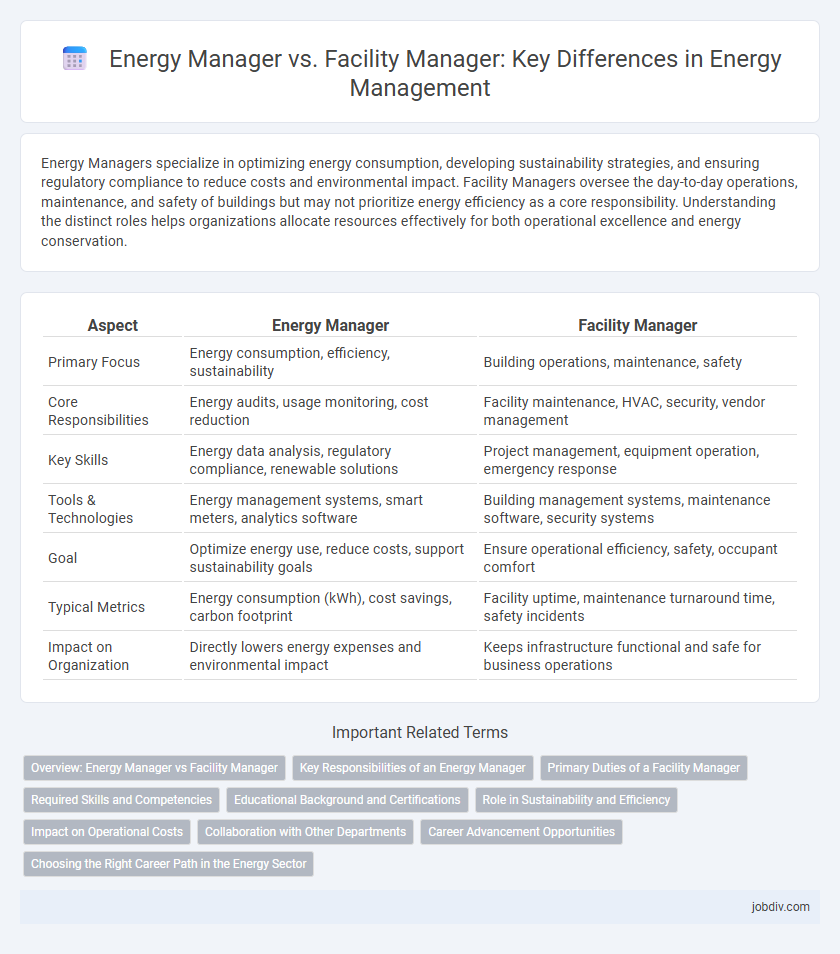Energy Managers specialize in optimizing energy consumption, developing sustainability strategies, and ensuring regulatory compliance to reduce costs and environmental impact. Facility Managers oversee the day-to-day operations, maintenance, and safety of buildings but may not prioritize energy efficiency as a core responsibility. Understanding the distinct roles helps organizations allocate resources effectively for both operational excellence and energy conservation.
Table of Comparison
| Aspect | Energy Manager | Facility Manager |
|---|---|---|
| Primary Focus | Energy consumption, efficiency, sustainability | Building operations, maintenance, safety |
| Core Responsibilities | Energy audits, usage monitoring, cost reduction | Facility maintenance, HVAC, security, vendor management |
| Key Skills | Energy data analysis, regulatory compliance, renewable solutions | Project management, equipment operation, emergency response |
| Tools & Technologies | Energy management systems, smart meters, analytics software | Building management systems, maintenance software, security systems |
| Goal | Optimize energy use, reduce costs, support sustainability goals | Ensure operational efficiency, safety, occupant comfort |
| Typical Metrics | Energy consumption (kWh), cost savings, carbon footprint | Facility uptime, maintenance turnaround time, safety incidents |
| Impact on Organization | Directly lowers energy expenses and environmental impact | Keeps infrastructure functional and safe for business operations |
Overview: Energy Manager vs Facility Manager
Energy Managers specialize in optimizing energy consumption, implementing sustainability initiatives, and ensuring compliance with energy regulations to reduce costs and environmental impact. Facility Managers oversee the maintenance, operation, and safety of physical buildings and infrastructure, managing HVAC, security systems, and space utilization. While both roles aim to improve building performance, Energy Managers focus specifically on energy efficiency and resource conservation, whereas Facility Managers handle broader operational responsibilities.
Key Responsibilities of an Energy Manager
An Energy Manager oversees energy consumption analysis, develops strategies for energy efficiency, and implements sustainable practices to reduce costs and environmental impact. They monitor utility usage, conduct energy audits, and ensure compliance with energy regulations and standards. Their role emphasizes optimizing energy performance through technological advancements and behavioral change programs in facilities.
Primary Duties of a Facility Manager
A Facility Manager primarily oversees the maintenance, safety, and operation of physical buildings and infrastructure, ensuring that all systems such as HVAC, electrical, and plumbing function efficiently. They coordinate with vendors, manage space allocation, and enforce compliance with health and safety regulations to optimize facility performance. Unlike Energy Managers who focus on monitoring and reducing energy consumption specifically, Facility Managers are responsible for the comprehensive upkeep and operational efficiency of the entire facility.
Required Skills and Competencies
Energy Managers require expertise in energy auditing, sustainability practices, and data analysis to optimize energy consumption efficiently. Facility Managers must possess broad knowledge of building systems, maintenance protocols, and safety regulations to ensure overall operational integrity. Both roles demand strong project management, communication skills, and familiarity with regulatory compliance, but Energy Managers focus more on energy efficiency technologies while Facility Managers handle comprehensive infrastructure management.
Educational Background and Certifications
Energy Managers typically hold degrees in engineering, environmental science, or energy management, with certifications like Certified Energy Manager (CEM) or Energy Management Professional (EMP) enhancing their qualifications. Facility Managers often possess backgrounds in facilities management, architecture, or business administration, supported by certifications such as Certified Facility Manager (CFM) or Facility Management Professional (FMP). The specialized education and credentials enable Energy Managers to focus on optimizing energy efficiency, while Facility Managers oversee broader operational functions of buildings and infrastructure.
Role in Sustainability and Efficiency
Energy Managers specialize in optimizing energy consumption by implementing sustainable practices and advanced technologies to reduce carbon footprints and operational costs. Facility Managers oversee the maintenance and operation of building systems, ensuring that energy-efficient equipment and sustainable infrastructure support overall facility performance. Collaboration between both roles enhances building sustainability, driving efficiency through targeted energy use strategies and integrated facility management.
Impact on Operational Costs
Energy Managers optimize energy consumption through data analytics and strategic initiatives, leading to significant reductions in utility expenses and enhanced cost-efficiency. Facility Managers oversee broader operational aspects, including maintenance and infrastructure, impacting costs indirectly through facility upkeep and resource allocation. Integrating Energy Management within Facility Management workflows amplifies operational cost savings by aligning energy efficiency goals with overall facility operations.
Collaboration with Other Departments
Energy Managers collaborate closely with engineering, maintenance, and sustainability teams to optimize energy consumption and implement efficiency projects. Facility Managers coordinate with HVAC, electrical, and operations departments to ensure building systems run smoothly and support energy-saving initiatives. Both roles require cross-departmental communication to align energy goals with overall facility performance and operational efficiency.
Career Advancement Opportunities
Energy Managers typically have greater career advancement opportunities in sustainability-focused industries due to their specialized expertise in energy efficiency, renewable energy systems, and regulatory compliance. Facility Managers may advance by broadening their skills in operations, maintenance, and infrastructure management, but often require additional training in energy management to compete for leadership roles in energy optimization. Companies prioritizing green initiatives increasingly value Energy Managers for strategic decision-making, offering pathways to senior positions such as Director of Energy or Sustainability Officer.
Choosing the Right Career Path in the Energy Sector
Energy Managers specialize in optimizing energy use, implementing sustainability strategies, and reducing operational costs through data analysis and regulatory compliance. Facility Managers focus on maintaining building systems, ensuring operational efficiency, and managing preventive maintenance across HVAC, electrical, and plumbing infrastructures. Choosing the right career path depends on interests in strategic energy management versus hands-on facility operations within the energy sector.
Energy Manager vs Facility Manager Infographic

 jobdiv.com
jobdiv.com